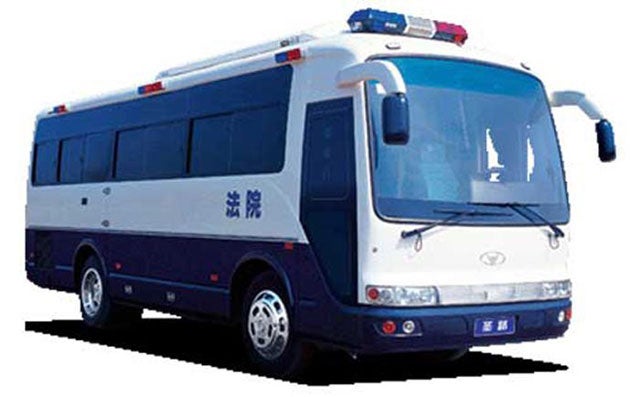Mobile death chambers take capital punishment on the road

China is innovating in the market of death with a fleet of execution buses in which convicts are efficiently and cleanly put to death by lethal injection.
The mobile death chamber means executions can be ordered and carried out by courts in towns and villages around a particular province, with executioners and medical staff shuttling between different jurisdictions. Authorities say the initiative is a deterrent against crime.
"First, we established there was demand for execution vehicles. Then we designed the vehicles and applied to the government for certification. This procedure is a must," said Mr Zhang, from the marketing department of Jinguan Auto – a Chongqing-based maker of ambulances, police lorries, bulletproof shields and armour-plated limos. Mr Zhang, who did not wish to give his first name, said the execution bus is a refitted 17-seater minibus which is seven metres long. So far the company had sold 10 of the vehicles.
Viewed in the online catalogue, the bus looks innocuous enough from the outside. Mr Zhang explained how criminals are tied hand and foot to a stretcher at the back, then injected with a cocktail of lethal toxins. The bus also features a video monitoring system, to ensure that executions comply with state rules, he explained.
The execution bus also makes it easier to use organs from prisoners for transplants, with doctors and nurses on hand to make sure they are transferred swiftly. This practice has been attacked as inhumane, although the Chinese government insists it takes place with the permission of the donors and their families.
China executes more prisoners than any other country, and non-violent crimes such as corruption and tax fraud, as well as the traditional capital offences such as murder, are among 68 crimes that carry the death penalty.
Before creation of the buses, the condemned were executed by being shot in the back of the head, but executioners were often forced to wear rubber boots, because of the large amount of blood involved in shootings, and occasionally prisoners had to be shot several times before finally dying.
One reason why executioners wanted a different method was because many of those killed were drug traffickers, and were said to have HIV/Aids. Executioners said they were worried they would become infected by spraying blood.
"Lethal injection reduces the pain and fear of the condemned. It is a more humane way to die," Mou Ruijin, associate professor of the Law School of Northeast University, told the Xinhua news agency after the province of Liaoning became the latest to switch to lethal injections.
The makers of the van say sales are steady, and urge any foreign governments interested to get in touch.
Join our commenting forum
Join thought-provoking conversations, follow other Independent readers and see their replies
Comments
Bookmark popover
Removed from bookmarks